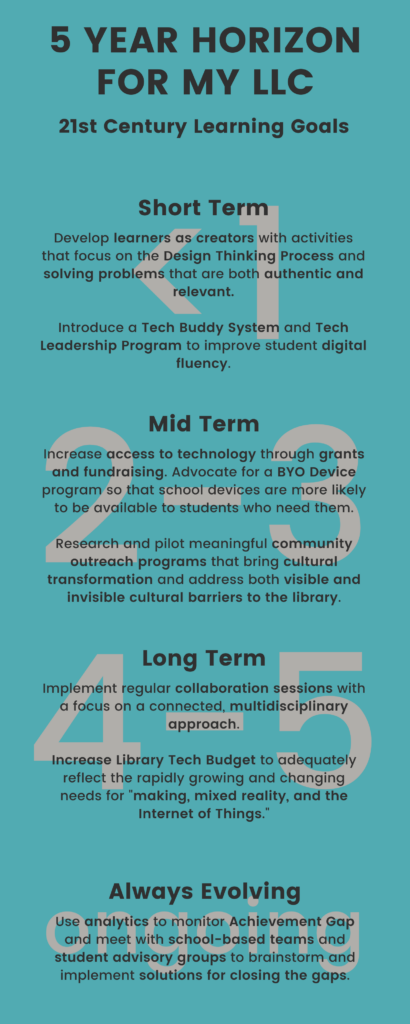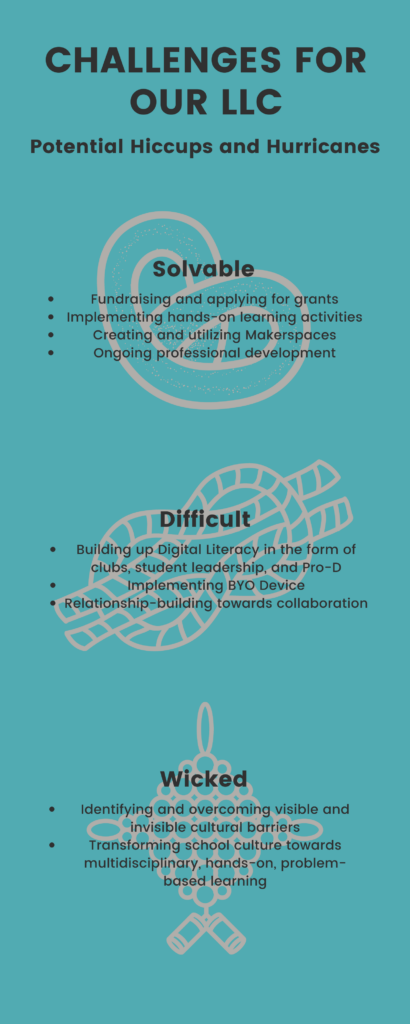The Horizon Report: K–12 Edition from New Media Consortium is something to keep visible for LLC goal development. With a focus on 21st Century tech implementation and leadership development, this report offers insight and applicable suggestions for LLC and VLLC growth that branches out to whole-school transformation. The latest report is 2017, which leaves me wondering when the next will be available.
I [admittedly] skimmed the contents of the 55-page report, with a strong focus on the trends, significant challenges, and timeline for adoption. Although I do not yet have my own LLC to root these goals and reflections, I focussed on a blend of the two Elementary-level school libraries that I have spent most of my time as a TTOC in.

The Executive Summary (pg. 4) highlights 10 Big Picture ideas that underpin the 18 topics covered in the report: 6 key trends, 6 six significant challenges, and six developments in educational technology. I have based my LLC goals on these topics.
I have organized these based on my understanding of leveraging change in a complex system (thanks to Donella Meadows’ resources, referenced below). It is in harnessing and changing the “mindset or paradigm out of which the system — its goals, power structure, rules, its culture — arises” that we truly see transformational change happen. My longterm goal is always to close the Achievement Gap (p.34) and shift towards collaborative, hands-on, multidisciplinary learning.
Question for you: Which of these goals is most relevant to your LLC and how would you begin pursuing it? Are there any resources you would use to guide your implementation?

From Solvable to Wicked, what challenges might arise as we work along the 5-year LLC goals?
Some of these goals are immediately implementable. They do not present radical challenges to the mindsets of traditional thinkers, they follow pre-set educational norms, and are in-line with existing district goals. If they meet these criteria, they fall under Solvable.
The Difficult challenges refer to goals that might require a longer time-commitment to achieve and most likely involve challenging existing power structures. While still attainable, these challenges may require strategic conversations, a long-term focus, shifting mindsets, and a focus on re-education.
The final set of challenges are termed Wicked because they require digging deep into the Systems of Public Education here in BC. These challenges require an awareness of the roots of our policies, and how those roots are the very things that prevent social justice. Facing these challenges requires an Intersectional Analysis, comfort in discomfort, and a willingness to engage in introspective growth. It takes identity work, emotional awareness, cultural humility, and bravery. It’s wicked, but it’s worth it.
Question for you: Which of these presents the greatest challenge to you? How would you go about meeting this challenge, and what resources/tools/skills would you need to hone and harness along the way?
References:
Freeman, A., Adams Becker, S., Cummins, M., Davis, A., and Hall Giesinger, C. (2017). NMC/CoSN Horizon Report: 2017 K–12 Edition. Austin, Texas: The New Media Consortium.
Meadows, D. (2012, April 5). Leverage Points: Places to Intervene in a System. The Academy for Systems Change. https://donellameadows.org/archives/leverage-points-places-to-intervene-in-a-system/.
Strauss, V. (2019, April 18). What the modern world has forgotten about children and learning. The Washington Post. https://www.washingtonpost.com/news/answer-sheet/wp/2016/08/19/what-the-modern-world-has-forgotten-about-children-and-learning/.
Recent Comments